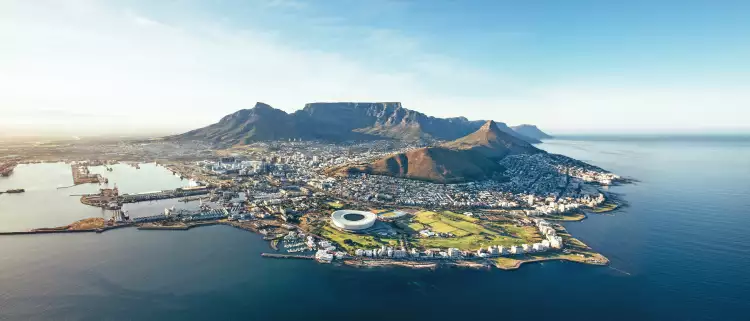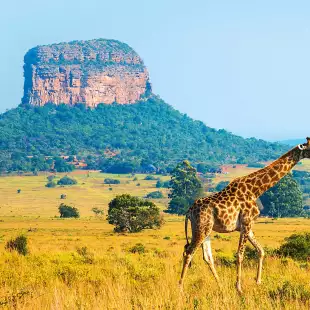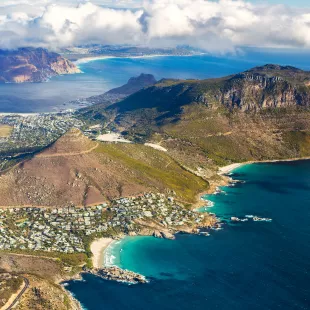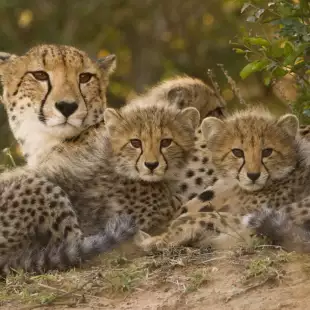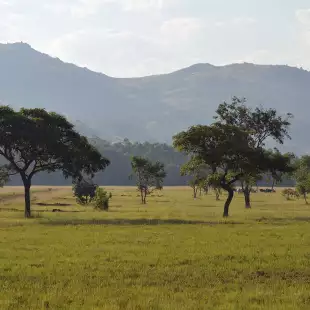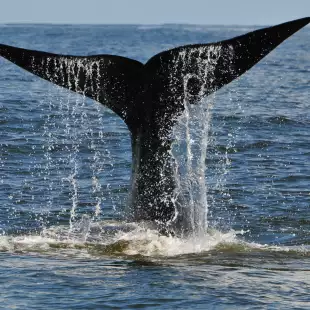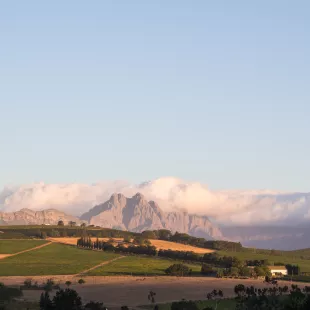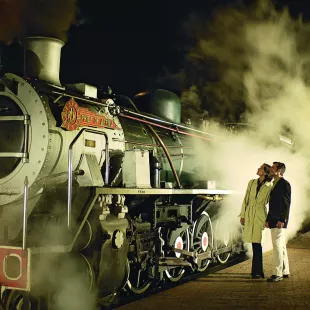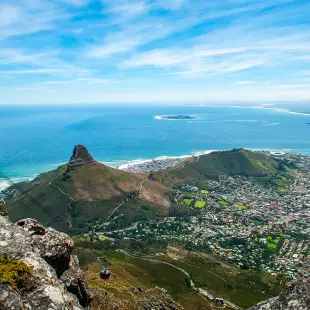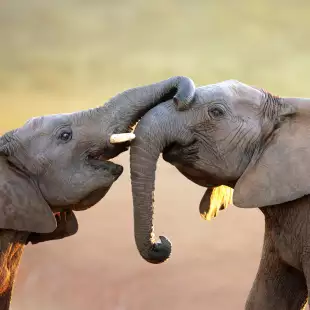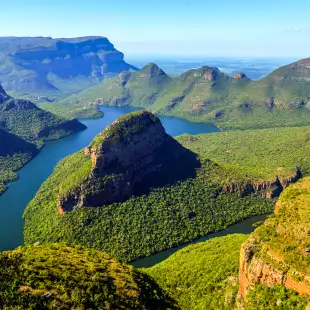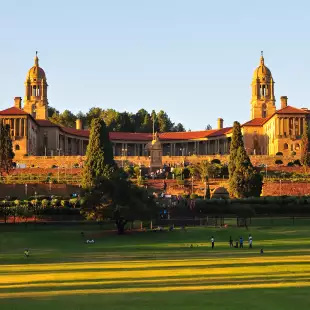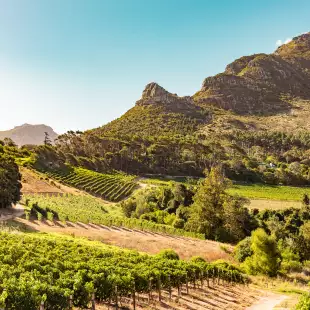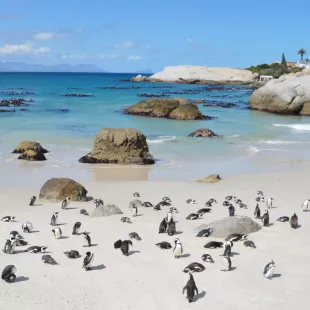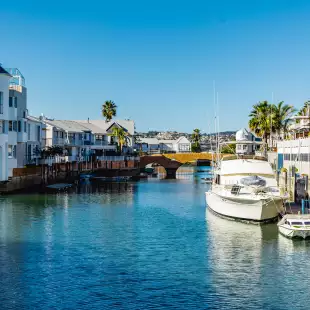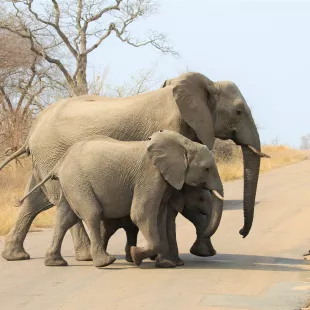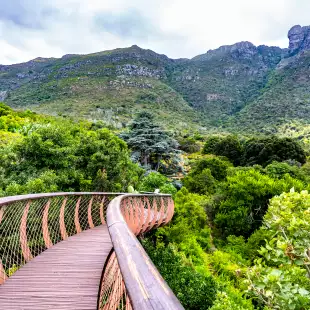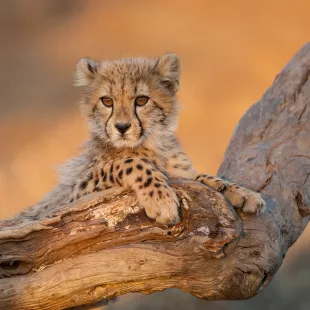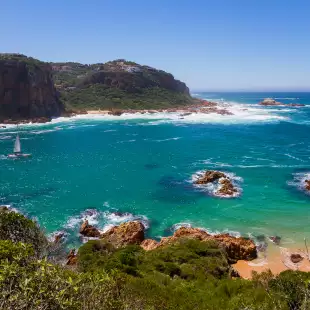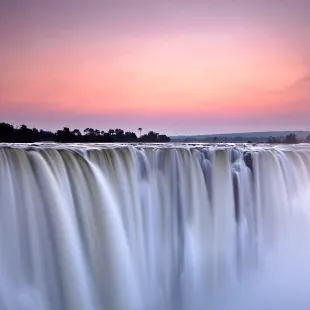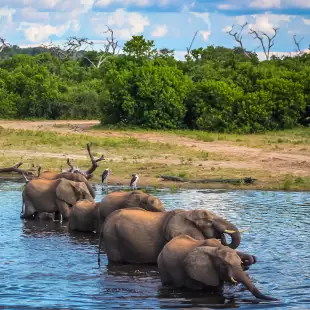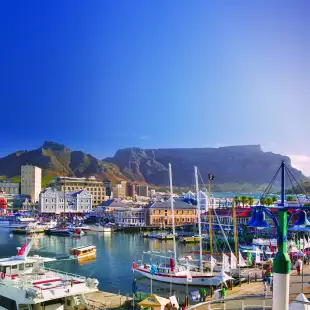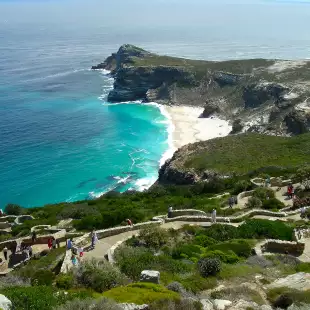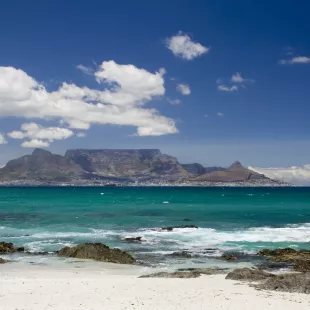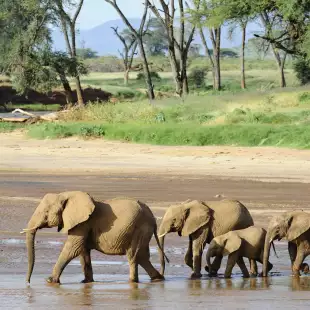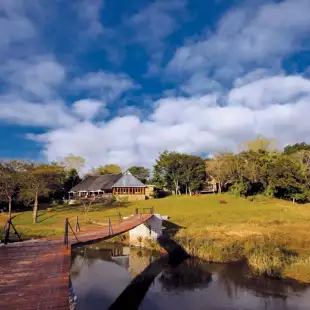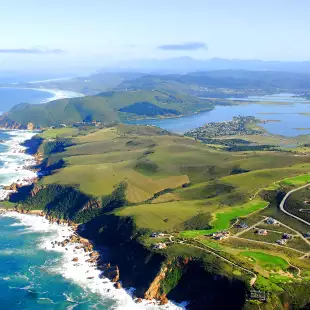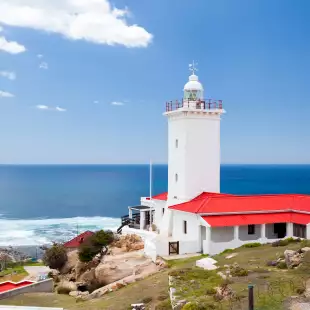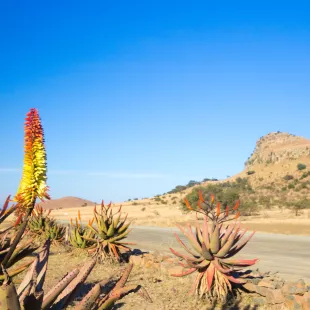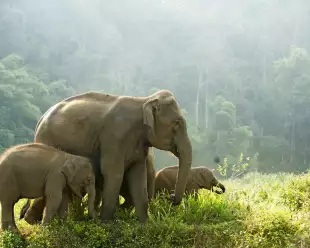South Africa is a destination that lives up to the cliché of ‘having it all’.
Cape Town is an incredibly diverse, vibrant city with a rich culture. It also happens to be surrounded by natural beauty, including the iconic Table Mountain. To the north of Cape Town you’ll find the wine regions, including Franschhoek and Stellenbosch, while travel east and you’ll reach the Garden Route and some of the prettiest coastline there is. And that’s all before you get to the Eastern Cape where you’ll find incredibly luxurious game reserves that are perfect for a safari, whether it’s your first time or fiftieth.
Cape Town
- Winter
- Winter runs May to September, and with it comes the rain, with the highest rainfall being in June and July.
- This is also when temperatures dip below 20°C in Cape Town.
- Summer
- The best time to visit Cape Town is October to April, when it is summer.
- This is generally the dry season, although April can see some rain.
- February is the hottest month, with temperatures around 25-30°C.
Eastern Cape
- Winter
- May to September sees temperatures drop, but some consider this to be an excellent time to go on safari because the milder daytime temperatures can mean that animals are more active.
- Morning and evening game drives can be a little chilly so wrap up warm.
- Summer
- October to April is the best time to visit the Eastern Cape.
- October and November can be rainy, as can February and March, but it makes the landscape green and luscious.
- January and February are the best time to go on safari in South Africa if you want to see baby animals.
Kruger and Johannesburg
- Winter
- The best time to visit Johannesburg, Kruger and the surrounding area is May to September, when it’s winter.
- The driest month in Kruger is December.
- This is when it becomes cool enough to visit, with highs of 26-29°C during the day, although evenings the temperature can drop below 10°C.
- This is also the dry season, although September can see some rainfall, which is welcomed by locals after months of very dry conditions.
- Summer
- October to April is summer, but this is also rainy season in Kruger
- This is when Kruger gets very hot! It averages 32°C in December, January and February
It was absolutely wonderful. We saw so much! From Kruger park and the animals to all the different places and the people were so very nice. Our tour guide Caanan was excellent with all the information he gave us, and Karen was great and very helpful.
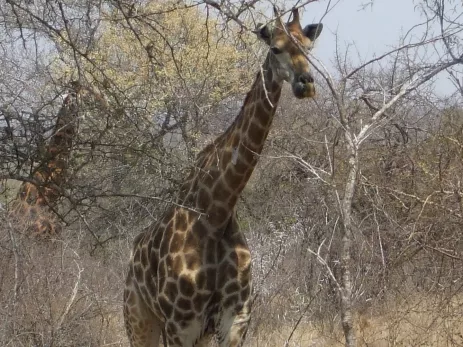
What to expect from South Africa in January
- Cape Town:
- Lows of 14°C and highs of 25°C
- Dry and hot
- Eastern Cape:
- Lows of 18°C and highs of 25°C
- Low chance of rain
- Kruger and surrounding:
- Lows of 21°C and highs of 32°C
- Hottest month in Kruger. It’s also rainy, with the chance of heavy tropical rainstorms
Temperatures in January are manageable in the Cape, making January a great time to visit southern South Africa. It’s also a popular time for a safari in the Eastern Cape, with game drives early in the morning during sunrise and late in the evening at sunset, before the day gets too hot.
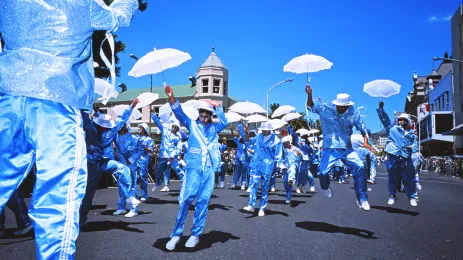
Festivals and Events in January
- Cape Town Minstrel Carnival
- Held on 2nd January each year
- It’s also known as the Tweede Nuwe Jaar (Second New Year)
- It’s a colourful parade through Cape Town with musicians and performers singing, dancing and playing music in bright uniforms
- The festival dates back to the early years of colonisation and slavery, as people from Africa, India, Indonesia and the Middle East were brought to the Cape as slaves. New Year was a time when they were allowed some freedoms, and were able to celebrate
- They didn’t have a shared language, but they made up for it with music and dance.
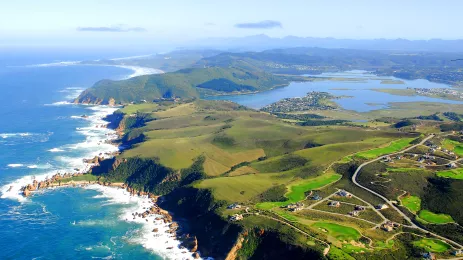
What to expect from South Africa in February
- Cape Town:
- Lows of 14°C and highs of 25°C
- Dry and hot with low humidity
- Eastern Cape:
- Lows of 18°C and highs of 25°C
- Some chance of rain
- Kruger and surrounding:
- Lows of 20°C and highs of 32°C
- Hot and rainy, with the chance of heavy tropical rainstorms
February is one of the best times to visit South Africa for safari, but also Cape Town and the Garden Route. This is because the weather is dry and hot, but the coastal towns – including Cape Town – experience lovely breezes from the ocean. Imagine blue skies and long days with lots of sunshine. February is also a popular time to visit, so places can get booked up way in advance.
If you’re on safari, February gives you a good chance to see some of the young animals start to come out and explore – they’ll likely have been born September to November, so now they’re a few weeks old and finding their feet.
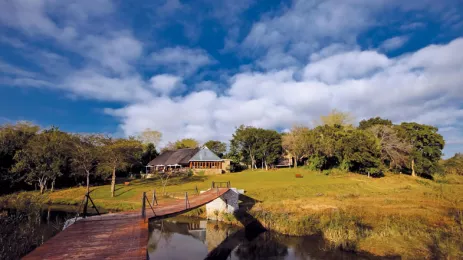
What to expect from South Africa in March
- Cape Town:
- Lows of 13°C and highs of 24°C
- Mostly dry and warm
- Eastern Cape:
- Lows of 17°C and highs of 25°C
- Less rainy days but heavier rainfall when it does
- Kruger and surrounding:
- Lows of 19°C and highs of 31°C
- Hot, with the rainy season coming to an end
March is the start of autumn. For those who can handle the heat, March can be a good time to visit Kruger as it’ll be verdant after a rainy season. It’s also the end of peak season and the start of shoulder season for the Cape (not warm enough to wear t-shirts but not cool enough to wear coats) so is popular with visitors looking for cooler weather and slightly less crowds. There can be spots of rain but there’s still likely to be sunny most of the time.

Festivals and events in March
- Cape Town Carnival
- This is similar to Carnival celebrations across the world
- There’s a huge parade through the city, with various floats adorned with extravagant decorations
- Dancers, marchers, musicians and acrobats perform as they move through the streets, while people cheer on from the sidelines.
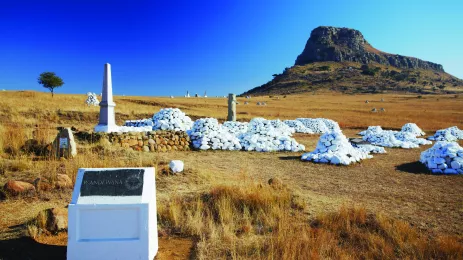
What to expect from South Africa in April
- Cape Town:
- Lows of 10°C and highs of 21°C.
- The start of the rainy season but still lots of nice days, and a drop in humidity
- Eastern Cape:
- Lows of 15°C and highs of 23°C
- Less rainy days but heavier rainfall when it does
- Kruger and surrounding:
- Lows of 16°C and highs of 29°C
- Significantly less rainy
April is a good time to visit South Africa if you want to see different areas of the country in one trip, because it tends to be warm across the board without being too hot. There’s a higher chance of sunny days than rainy days.
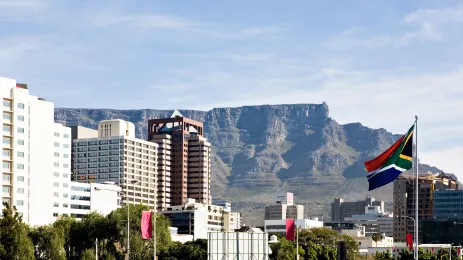
Festivals and events in April
- Afrikaburn (April-May)
- Afrikaburn is the South African equivalent of the famous Burning Man festival that’s held in the USA each year
- The group that hosts the festival describes itself as a “community of participants who come together to create art, costume, performance, theme camps, music, mutant vehicles and much, much more. All of this is created through a volunteer and gifting culture.”
- Freedom Day
- Held annually on 27th April
- It marks the date when the first elections post-apartheid were held on this day in 1994, and the new constitution was introduced
- These were the first elections where a person of any race over the age of 18 was allowed to vote
- In that election, Nelson Mandela was elected President of South Africa
- It marks a pivotal moment with the official end of racial segregation and oppressive apartheid
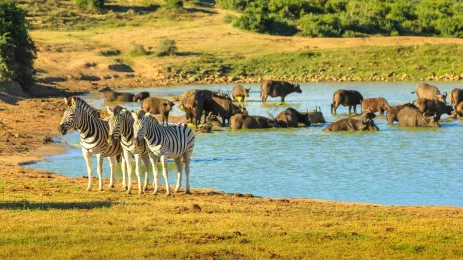
What to expect from South Africa in May
- Cape Town:
- Lows of 10°C and highs of 20°C
- Big drop in humidity, but increase in chance of rain
- Eastern Cape:
- Lows of 12°C and highs of 22°C
- Mostly dry days
- Kruger and surrounding:
- Lows of 11°C and highs of 28°C
- Low chance of rain, milder weather and lots of sunshine
May tends to be quiet in the Western Cape as the temperatures dip and the chance of rain increases. Safari is less popular in the game reserves of the Eastern Cape from May to August as the morning and evening temperatures can be chilly, but the animal sightings can be amazing as the animals tend to be more active during the day while it’s not too hot.
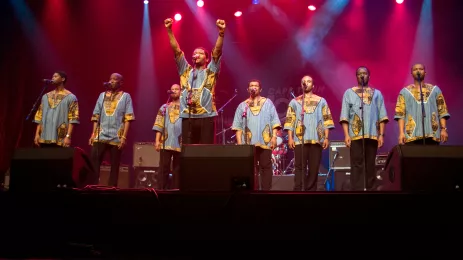
Festivals and events in May
- Cape Town International Jazz Festival
- This music festival is held each year, and sees international and African artists come together to perform over two days in Cape Town
- It has been going for over 20 years, and in recent years has attracted over 30,000 visitors
- It’s ranked as one of the best jazz festivals in the world, and has hosted big names such as Lauryn Hill, and Earth, Wind and Fire.
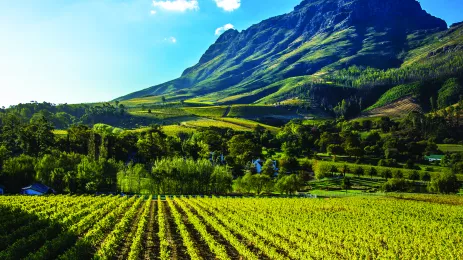
What to expect from South Africa in June
- Cape Town:
- Lows of 7°C and highs of 18°C
- Good chance of rain
- Eastern Cape:
- Lows of 9°C and highs of 20°C
- Low chance of rain, but if it does rain it can be heavy
- Kruger and surrounding:
- Lows of 6°C and highs of 26°C
- Generally dry days but the coldest month in Kruger
June is the month to visit Cape Town if you like cooler temperatures, as winter hits the city. We also recommend escaping to the Winelands, to towns like Franschhoek and Stellenbosch, for cosy wine tastings and delicious meals with cosy fires.
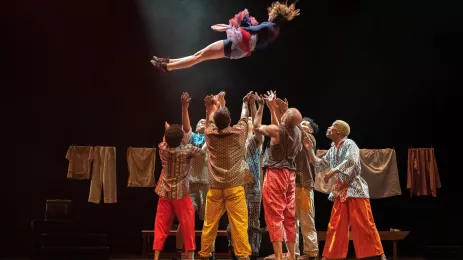
Festivals and events in June
- National Arts Festival (June or July)
- Held each year in Makhanda – formerly known as Grahamstown – in the Eastern Cape
- This is South Africa’s longest running arts festival
- It celebrates artistic performance in all forms – theatre, sculpture, dance, music, circus, film, comedy and more
- It celebrates diversity in people, genre, language and more, and aims to be an inclusive experience.
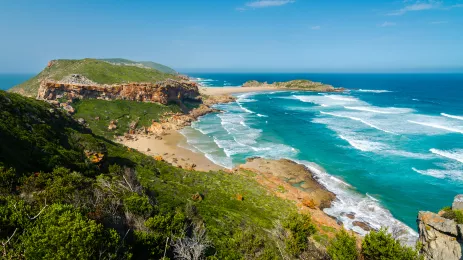
What to expect from South Africa in July
- Cape Town:
- Lows of 7°C and highs of 18°C
- Wettest month for Cape Town
- Eastern Cape:
- Lows of 9°C and highs of 20°C
- Low chance of rain, but if it does rain it can be heavy
- Kruger and surrounding:
- Lows of 7°C and highs of 26°C
- Generally dry days
July is a popular time to visit the Western Cape, but now it’s more about the coast as it’s the start of whale watching season. Cape Town and the Winelands will be much quieter. Head to Hermanus and Plettenberg Bay to see southern right whales begin arriving from Antarctica – they’re swapping the cold waters of the Antarctic for the warmer waters of South Africa, the perfect temperatures for them to have their babies.
On the flip side, this is a very popular time for safaris in Kruger as it’s warm and dry, but not too hot. Game viewing opportunities are at their peak.
Festivals and events in July
- Durban July Cultural Festival
- Dates back to 1987
- Takes place each year on the first Saturday of July
- It’s a horserace held at Greyville Racecourse in Durban
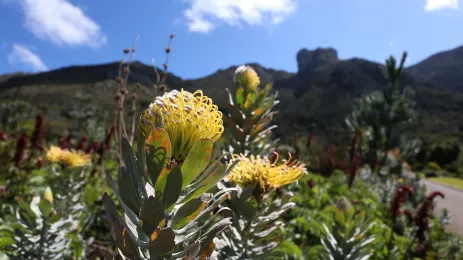
What to expect from South Africa in August
- Cape Town:
- Lows of 7°C and highs of 19°C
- Good chance of rain
- Eastern Cape:
- Lows of 10°C and highs of 20°C
- Chance of rain increases
- Kruger and surrounding:
- Lows of 9°C and highs of 27°C
- The driest month in Kruger
August ushers in the spring, and with it the blooming of colourful flowers and greenery, particularly on the west coast outside of Cape Town. It’s arguably the best time to visit Kirstenbosch National Botanical Garden – a stop on our South Africa tour – as it explodes with colour. It’s also whale watching season, so you may spot southern right whales in the ocean off the south coast.
August is the driest month in the Kruger with nice warm weather, making it one of the best times to visit this part of South Africa.

What to expect from South Africa in September
- Cape Town:
- Lows of 9°C and highs of 22°C
- Chance of rain drops considerably as it transitions to the dry season
- Eastern Cape:
- Lows of 12°C and highs of 20°C
- Low chance of rain, but if it does rain it can be heavy
- Kruger and surrounding:
- Lows of 13°C and highs of 29°C
- The start of rainy season but not heavy
September is shoulder season for safaris in the Eastern Cape. The morning and evening temperatures are warming up a little bit, but you’ll still need to wrap up in a jacket and blanket on the game drives. Daytime temperatures are also getting warmer, and many animals will start having their young. It’s the middle of whale watching season, and you can sometimes see them from the coast, or take a boat out to spot southern right whales. It’s also a good time for birdwatchers as some migratory birds start to return to the Eastern Cape.
It's a good month to visit different spots across the country in one visit as there’s a good chance for dry days and warm temperatures.
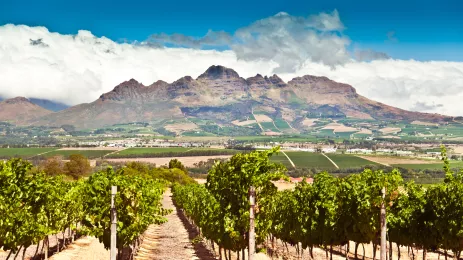
Festivals and events in September
- South African Cheese Festival
- Held yearly in Stellenbosch, in the Winelands outside of Cape Town
- Expect to find cheese (as the name suggests) plus wine and other accompaniments
- Music is on throughout, as well as kids’ entertainment and cooking demonstrations
- Heritage Day
- Held on 24th September each year
- On this day, South Africans are encouraged to celebrate the diverse culture, beliefs and traditions of the people who make up South Africa
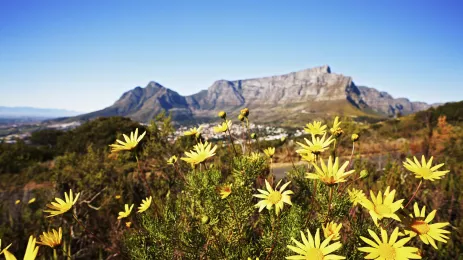
What to expect from South Africa in October
- Cape Town:
- Lows of 10°C and highs of 22°C
- Low chance of rain
- Eastern Cape:
- Lows of 13°C and highs of 21°C
- Low chance of rain, but if it does rain it can be heavy
- Kruger and surrounding:
- Lows of 16°C and highs of 30°C
- The rainy season has begun
October is an excellent time to visit before the peak season starts. October marks the end of spring, so the colourful carpets of flowers are still visible in some areas. There’s a low chance of rain in the southern part of the country, and although the rainy season has begun in the north, the rains are not yet in full force.
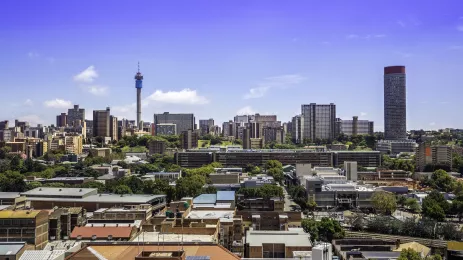
Festivals and events in October
- Johannesburg Wine and Food Festival
- Celebrates South African wine from across 50 wine estates
- There are tastings and samplings throughout the day
- Food of all kinds is on sale
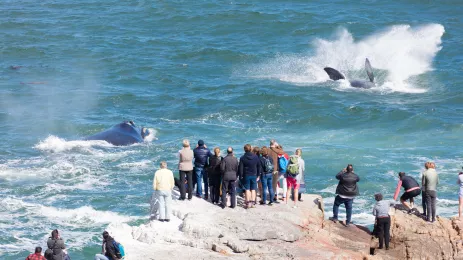
What to expect from South Africa in November
- Cape Town:
- Lows of 11°C and highs of 23°C
- Dry season has begun
- Eastern Cape:
- Lows of 15°C and highs of 22°C
- Low chance of rain, but if it does rain it can be heavy
- Kruger and surrounding:
- Lows of 18°C and highs of 30°C
- High chance of rain
November marks the official start of peak season in the Western and Eastern Cape. It’s the best time to visit Hermanus for whale watching as it’s the end of whale watching season and they’re usually visible from the coast and on boat trips, as the southern right whales finish their visit to warm South African waters to have their young.
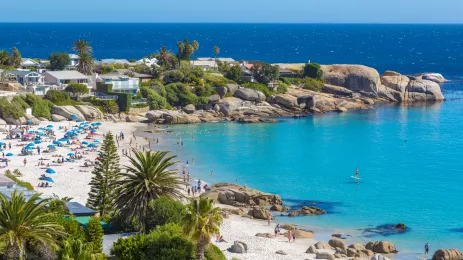
What to expect from South Africa in December
- Cape town:
- Lows of 13°C and highs of 24°C
- Dry season, but humidity starts to rise
- Eastern Cape:
- Lows of 17°C and highs of 24°C
- Low chance of rain, but if it does rain it can be heavy
- Kruger and surrounding:
- Lows of 20°C and highs of 32°C
- The rainiest month in Kruger
December is a popular time for international travellers to visit South Africa, especially to escape the cold weather of the Northern Hemisphere, but it’s also popular for domestic tourist who are looking to get away for the festive period, when schools will have their summer holidays.
Well organised trip from start to finish. Fantastic Riviera and local guide, helpful, knowledgeable and friendly.
Frequently asked questions
- There are pros and cons to going on safari in the different months of the year, so many of the big game reserves will be open all year round, although smaller ones may shut during their quiet months.
- The Big Five are visible year-round, but September is best for bird watchers
- The rainfall in the Eastern Cape is pretty steady throughout the year, so it’s more about the temperatures you find comfortable, and whether you’d prefer to be in peak, off-peak or shoulder season – this will impact the cost and business of the game reserves
Autumn and winter – May to September
- Game viewing opportunities are great during the dry winter months June to September. As water supply is scarce, you have a chance to see animals converge at watering holes
- Winter is also off-peak season, making it quieter and cheaper to visit
- September is when the animals start giving birth, and the young animals will start getting more active
- The weather will be chilly on early morning and late evening game drives, so you’ll have to wrap up warm as the sun rises or sets, but if this is an issue then opt for August and September which are a bit warmer
Spring and summer – October to April
- As most animals have given birth September to November, this is the prime opportunity to see the youngsters
- Summer days are warm and mostly sunny, although there is some chance of short and heavy thunderstorms
- November to February is peak season for safari in the Eastern Cape because of the beautiful lush green scenery and sightings of new-born wildlife.
Average temperatures by month
| Jan | Feb | Mar | Apr | May | Jun | Jul | Aug | Sep | Oct | Nov | Dec | |
| Cape Town | 27°C | 27°C | 26°C | 23°C | 20°C | 18°C | 18°C | 18°C | 19°C | 22°C | 24°C | 20°C |
| Eastern Cape | 22°C | 22°C | 20°C | 17°C | 16°C | 13°C | 13°C | 15°C | 17°C | 17°C | 18°C | 20°C |
| Kruger and surrounding | 27°C | 26°C | 25°C | 23°C | 20°C | 16°C | 17°C | 18°C | 21°C | 23°C | 24°C | 26°C |
Average rainfall by month
| Jan | Feb | Mar | Apr | May | Jun | Jul | Aug | Sep | Oct | Nov | Dec | |
| Cape Town | 8mm | 10mm | 9mm | 41mm | 68mm | 80mm | 84mm | 72mm | 40mm | 28mm | 22mm | 15mm |
| Eastern Cape | 145mm | 155mm | 127mm | 91mm | 42mm | 25mm | 45mm | 25m | 41mm | 111mm | 96mm | 135mm |
| Kruger and surrounding | 93mm | 93mm | 68mm | 37mm | 14mm | 11mm | 12mm | 9mm | 26mm | 43mm | 66mm | 94mm |
